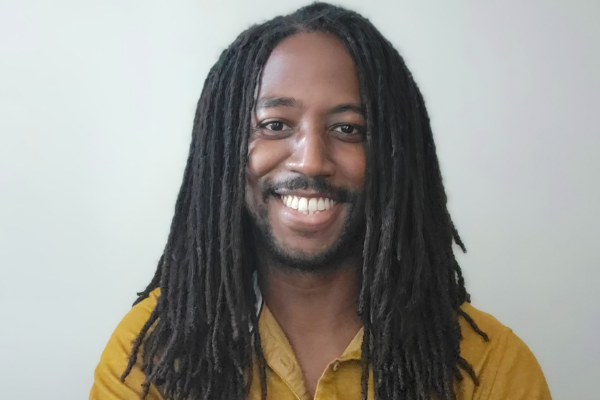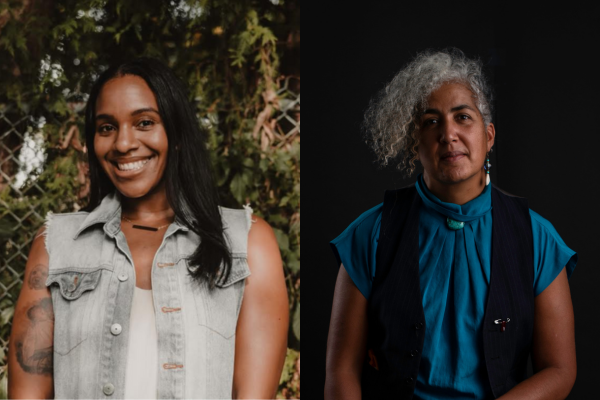Research is a ‘commitment’ and ‘celebration’: U of T postdoctoral scholar documents Black queer health and wellbeing


Cornel Grey was driven to pursue Black queer studies through a place of frustration.
While pursuing his doctoral studies, Grey – whose research explores kinship between Black queer men through physical touch – wanted to create space for an often stigmatized topic of Black queer life. This led to an interest in how the community maintains health and wellbeing.
“I was seeking connection in a space that wasn’t really able to grapple with Black queer life,” says Grey, a postdoctoral fellow at the Dalla Lana School of Public Health.
“Some of the ways that Black queer communities seek pleasure are described as risky behaviours. I wanted to offer a different narrative about how Black queer men make decisions to maintain health and wellbeing.”
In April, Grey received $7,000 as one of nine winners of the Black Research Network’s IGNITE grant – an initiative to support Black faculty, librarians and postdoctoral scholars working broadly in any disciplinary category at U of T – to start new research that will document the positive impacts of touch on the community’s health.
With the help of the grant, Grey will be able to recruit participants and conduct ethnographic work to share insights on what Black queer men need to live healthy lives.
“The IGNITE grant will afford me the opportunity to pursue qualitative research to better understand the intimate practices of Black queer men,” says Grey, who is also a PhD candidate at the Women & Gender Studies Institute at the University of Toronto.
“I want to hear from Black queer men directly about the forms of touch that are important to them and how their relationship to touch has changed over the past two years in particular.”
This new project will build on the foundation of Grey’s work, which examines how public health policy has painted a negative portrayal of intimacy since the 1981 HIV/AIDs epidemic to understand how Black queer socialities challenge questions of risk, health and relationality.
At the Dalla Lana School of Public Health, Grey has already been documenting the impact that the COVID-19 pandemic has had on the lives of gay, bisexual and queer men.
Some of those experiences are outlined in a co-authored journal article published in Critical Public Health. The article highlights the main factors that affected the community during Ontario’s first lockdown through 25 in-depth interviews taken between March to July 2020.
As narratives of risk re-emerged on the heels of the COVID-19 pandemic, Grey and his co-authors describe queer communities as resilient during public health crisis. The study outlines how the community applied health and safety strategies utilized during the HIV/AIDS epidemic to the current pandemic through public health morality.
For example, when it came to health and sexual decision-making, some precautions taken included conversations about wearing a mask to stop the spread of COVID-19, asking partners if they have come into contact with the virus and creating social bubbles. Participants also expressed more concern about spreading COVID-19 to others, more so than personally getting sick.
“People were trying to carve out strategies to ensure that they had access to connection and contact within the context of the first lockdown,” Grey says.
“Access to community was very important, particularly for those whose identities aren’t affirmed or supported by family.”
Grey: Research is a ‘commitment’ and ‘celebration’
Aside from research, Grey dedicates his time to various volunteer roles to provide safe and inclusive spaces for the LGBTQ community. With in-person gatherings disrupted due to the pandemic, Grey and a group of friends launched a podcast to highlight LGBTQ+ politics, pop culture and how the Caribbean queer community were staying virtually connected.
As for his journey in academia so far, Grey believes that researchers have a commitment to support the groups that they work with through a compassionate and authentic community-based approach. In turn, he says that it’s important to find a mentor that will acknowledge and guide students’ research goals and interests with that same framework.
“Find a supervisor or a mentor who understands your vision and where you want to go in terms of your career,” Grey says.
“We have a certain kind of commitment to the communities that we’re doing work with. Making sure you’re able to surround yourself with a team of people who can support and celebrate that decision is really important.”







